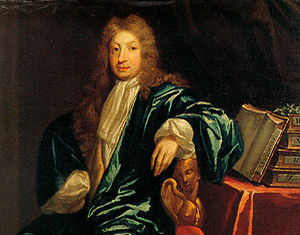
It can be reasonably argued that the liberties of modern
Western society stem from the Enlightenment period. The case is especially
strong for the United States considering that Thomas Jefferson used John Locke’s
phrase “life, liberty, and the pursuit of happiness” in the Declaration of
Independence. The American and French revolutions can both attribute their
inceptions to Locke’s tenacity for advocating independent thought. By
independent thought, I mean thought and ideas the thinker has come to by method
of his or her contemplation and who’s thought and ideas align with the thinker’s
own philosophical systems. In this regard, even if the idea is detrimental to
others, the idea comes from an unshackled thinker. Once thought was freed, the
body followed. Both the Church and the Crown, entities whose survival depends
on governed thought, were weakened by Locke’s ideas. This weakening, however,
pre-dated Locke by half a century. The Scientific Revolution of the 16
th
century championed sovereignty of the self by furthering the understanding of
the world. A world understood loses its grip of fear over the thinker. No
longer fearful, the thinker has no need to recourse to religion or monarchy for
understanding. The thinker may plant his own Edens. Nevertheless, Locke’s
deserves the merit of taking those unspoken ideas of the Scientific Revolution
and translating them to ink. And so, America realized that is could live
without Great Britain and the French realized that the aristocrats’ power had
been given, unknowingly, by the people and so could be taken, now knowingly, by
the people. Fast forward to modern times. We benefit from the First Amendment. Vitriolic
speech is allowed. The government cannot silence anyone. There is freedom of
the press. And it is good. And every time an idea becomes outmoded though
those in the majority, by being the majority, think the idea is still great, it
is the individual, by ignoring the majority, and through independent thought,
who will usher in the new paradigms.
 It can be reasonably argued that the liberties of modern
Western society stem from the Enlightenment period. The case is especially
strong for the United States considering that Thomas Jefferson used John Locke’s
phrase “life, liberty, and the pursuit of happiness” in the Declaration of
Independence. The American and French revolutions can both attribute their
inceptions to Locke’s tenacity for advocating independent thought. By
independent thought, I mean thought and ideas the thinker has come to by method
of his or her contemplation and who’s thought and ideas align with the thinker’s
own philosophical systems. In this regard, even if the idea is detrimental to
others, the idea comes from an unshackled thinker. Once thought was freed, the
body followed. Both the Church and the Crown, entities whose survival depends
on governed thought, were weakened by Locke’s ideas. This weakening, however,
pre-dated Locke by half a century. The Scientific Revolution of the 16th
century championed sovereignty of the self by furthering the understanding of
the world. A world understood loses its grip of fear over the thinker. No
longer fearful, the thinker has no need to recourse to religion or monarchy for
understanding. The thinker may plant his own Edens. Nevertheless, Locke’s
deserves the merit of taking those unspoken ideas of the Scientific Revolution
and translating them to ink. And so, America realized that is could live
without Great Britain and the French realized that the aristocrats’ power had
been given, unknowingly, by the people and so could be taken, now knowingly, by
the people. Fast forward to modern times. We benefit from the First Amendment. Vitriolic
speech is allowed. The government cannot silence anyone. There is freedom of
the press. And it is good. And every time an idea becomes outmoded though
those in the majority, by being the majority, think the idea is still great, it
is the individual, by ignoring the majority, and through independent thought,
who will usher in the new paradigms.
It can be reasonably argued that the liberties of modern
Western society stem from the Enlightenment period. The case is especially
strong for the United States considering that Thomas Jefferson used John Locke’s
phrase “life, liberty, and the pursuit of happiness” in the Declaration of
Independence. The American and French revolutions can both attribute their
inceptions to Locke’s tenacity for advocating independent thought. By
independent thought, I mean thought and ideas the thinker has come to by method
of his or her contemplation and who’s thought and ideas align with the thinker’s
own philosophical systems. In this regard, even if the idea is detrimental to
others, the idea comes from an unshackled thinker. Once thought was freed, the
body followed. Both the Church and the Crown, entities whose survival depends
on governed thought, were weakened by Locke’s ideas. This weakening, however,
pre-dated Locke by half a century. The Scientific Revolution of the 16th
century championed sovereignty of the self by furthering the understanding of
the world. A world understood loses its grip of fear over the thinker. No
longer fearful, the thinker has no need to recourse to religion or monarchy for
understanding. The thinker may plant his own Edens. Nevertheless, Locke’s
deserves the merit of taking those unspoken ideas of the Scientific Revolution
and translating them to ink. And so, America realized that is could live
without Great Britain and the French realized that the aristocrats’ power had
been given, unknowingly, by the people and so could be taken, now knowingly, by
the people. Fast forward to modern times. We benefit from the First Amendment. Vitriolic
speech is allowed. The government cannot silence anyone. There is freedom of
the press. And it is good. And every time an idea becomes outmoded though
those in the majority, by being the majority, think the idea is still great, it
is the individual, by ignoring the majority, and through independent thought,
who will usher in the new paradigms.


Comments
Post a Comment